Wolfson College, Cambridge
Wolfson College (/ˈwʊlfsən/) is a constituent college of the University of Cambridge in Cambridge, England. The majority of students at the college are postgraduates. The college also admits "mature" undergraduates (aged 21 and above), with around 15% of students studying undergraduate degree courses at the university. The college was founded in 1965 as "University College", but was refounded as Wolfson College in 1973 in recognition of the benefaction of the Wolfson Foundation.[6] Wolfson is located to the south-west of Cambridge city centre, near the University Library.
| Wolfson College | ||||||||||||||||
|---|---|---|---|---|---|---|---|---|---|---|---|---|---|---|---|---|
| University of Cambridge | ||||||||||||||||
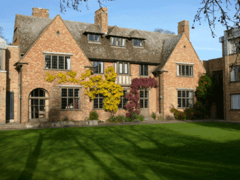 Bredon House, Wolfson College | ||||||||||||||||
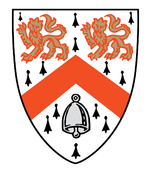 Arms of Wolfson College | ||||||||||||||||
| Location | Barton Road, Cambridge (map) | |||||||||||||||
| Abbreviation | W[1] | |||||||||||||||
| Motto | "Ring True"[2] | |||||||||||||||
| Founder | University of Cambridge[3] | |||||||||||||||
| Established | 1965[3] | |||||||||||||||
| Named after | Wolfson Foundation[2] | |||||||||||||||
| Previous names | University College (1965–1972) | |||||||||||||||
| Age restriction | Aged 21 or over | |||||||||||||||
| Sister college | St Antony's College, Oxford | |||||||||||||||
| President | Jane Clarke | |||||||||||||||
| Undergraduates | 184[lower-alpha 1] | |||||||||||||||
| Postgraduates | 703[lower-alpha 1] | |||||||||||||||
| Fellows | 106[lower-alpha 1] | |||||||||||||||
| Endowment | £27.85m[lower-alpha 2] | |||||||||||||||
| Website | wolfson | |||||||||||||||
| Students' association | wolfson | |||||||||||||||
| Boat club | wolfsonboatclub | |||||||||||||||
| Map | ||||||||||||||||
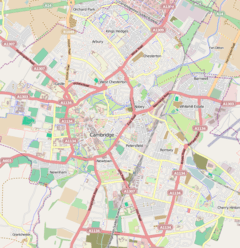 Location in Cambridge | ||||||||||||||||
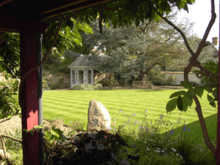
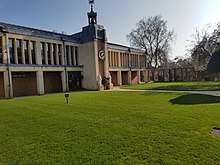
.jpg)
As one of the more modern colleges in Cambridge, Wolfson does not follow all of the traditions of some of the university's older colleges. For example, since the college's founding there has been no "High Table" reserved for Fellows at Formal Hall dinners; students and Fellows mix and dine together, and the tradition of wearing academic gowns to such occasions is encouraged but is not compulsory. Both Fellows and students at the college have access to all the facilities. With students from over 70 countries, Wolfson claims to be one of Cambridge's most cosmopolitan colleges.[7] It was the first college of the university to admit men and women as both students and Fellows.[8]
The current President of Wolfson College is scientist Jane Clarke.
History
After the Second World War, the number of graduates of other universities who went to Cambridge to do research increased significantly. The university therefore decided to found University College in 1965 to help accommodate these students. The college was based at Bredon House, a property built in the early twentieth century by John Stanley Gardiner, who was a Professor of Zoology at the university from 1909 to 1937. He donated the house, with its long narrow garden running from Barton Road to Selwyn Gardens, to the university upon his death in 1946. The college then purchased further property on its eastern boundary.
University College was opened on 30 June 1965 as a college for postgraduate students, with the classicist John Sinclair Morrison as its first President. At the time, all the undergraduate colleges of the university were single-sex institutions and University College was the first in the university to admit men and women as both students and Fellows. The college, from its outset, set out to be a cosmopolitan and egalitarian institution with distinct differences from the older, more traditional Cambridge colleges, with no Senior Combination Room, no "High Table" reserved for Fellows at formal dinners in the college and no portraits hung in the Dining Hall.
The college's founding deed required the college to either find an endowment within 10 years or face dissolution. In 1972, the Wolfson Foundation agreed to provide a capital endowment and help to fund the construction of central buildings around Bredon House and the college's East and West Courts. In recognition of this, the college was renamed Wolfson College on 1 January 1973.
The new buildings (designed by the architect Michael Mennim) were opened by Queen Elizabeth II and the Duke of Edinburgh in 1977. Though most of the college's buildings are modern, the design of the campus is similar to that of the university's older colleges, with buildings grouped around two main courts. The floor of the entrance hall to the main building is made of thin slices of granite taken from the old London Bridge (the main section of which was taken to Arizona to be rebuilt in the late 1960s).
Further building and acquisition of neighbouring properties has continued. In the 1980s, the college purchased the house and garden owned by Sir Vivian Fuchs on the western side on the college. Plommer House on the northern side of the college was also left to the college in his will by Dr Hugh Plommer, a founding Fellow of the college. The acquisition of property has allowed for the building of a number of new facilities, mainly funded by donations from philanthropic foundations and individuals. Other major benefactions have come from the Fairleigh Dickinson Foundation and the Toda Foundation. In the 1990s, with the help of the Gatsby Foundation, the college purchased the "western field" on which was built the Chancellor's Centre and further residential blocks.
Buildings and Grounds
The Lee Library
Opened in 1994, the Lee Seng Tee Library (Lee Library) was donated to the college by the Singaporean businessman and philanthropist Dr Lee Seng Tee (whose daughter studied at the college). Dr Lee also donated the funds used to build the Lee Seng Tee Hall. The library was designed by architects Brewer, Smith and Brewer. The ground floor foyer is home to a scale model of the armillary sphere on the roof of the Peking Observatory. On the first floor there is a bust of Tan Sri Dr Lee Kong Chian, father of the benefactor. The library comprises over 60 quiet places to work and is open 24 hours a day all year, apart from the 25–26 December and 1 January.[9] The college is located a short walk from the University Library.[10]
In February 2018, students at the college were evacuated from the Lee library, and a number of accommodation blocks, after an unexploded WWII grenade was found in the President's Garden. There were no injuries and it was soon discovered that the device was a practice grenade with no live ammunition.[11]
College Gardens
In the first half of the twentieth century, much of the land on which the college is now situated comprised gardens which belonged to houses in Selwyn Gardens. As the college grew particular natural landmarks, such as the mulberry tree outside the Porters' lodge, were retained as features. The garden comprises a wide variety of trees, scented shrubs, dwarf conifers, as well as a distinctive range of shrubs with colourful stems.
The college's head gardener occasionally provides a guided tour of the gardens to local interested groups. During the summer, Wolfson opens its gardens to the public as part of the NGS Open Gardens network.[12]
Student life
The college is known for its entertainment events and performances, which attract visitors from many other colleges of the university. These activities include formal dinners, concerts, dancing nights and music displays.
The Club Room, at the heart of the college, includes the college bar and a dance floor space, and is a café during the day. It is the main communal space for students, and is the venue for many entertainment events.[13]
The Wolfson College Boat Club is a popular society, and Wolfson is one of the strongest graduate rowing colleges in Cambridge.[14]
People associated with Wolfson
Notable alumni
| Name | Birth | Death | Career |
|---|---|---|---|
| Rupiah Banda | 1937 | President of Zambia | |
| Frederick Kayanja | 1938 | Ugandan physician and academic | |
| Song Sang-Hyun | 1941 | President of the International Criminal Court | |
| Ruth Dudley Edwards | 1944 | Irish historian and biographer | |
| Shahid Aziz Siddiqi | 1945 | Vice-Chancellor of Ziauddin Medical University and former Federal Secretary in the Government of Pakistan | |
| Matthew Fisher | 1946 | English composer | |
| Ken Yeang | 1948 | Malaysian skyscraper architect | |
| Cristina Bicchieri | 1950 | Philosopher and SJP Harvie Professor of Social Thought and Comparative Ethics in the Philosophy Department at the University of Pennsylvania | |
| Conor Gearty | 1950 | Professor of Human Rights Law at the London School of Economics, Director of the Institute of Public Affairs, and former Director of the Centre for the Study of Human Rights | |
| Susan Kiefel | 1954 | Chief Justice of the High Court of Australia | |
| Carrie Lam | 1957 | Chief Executive of Hong Kong. Awarded Honorary Fellowship in 2017, but resigned in 2020 after the college raised concerns about her commitment to the protection of human rights and the freedom of expression in handling 2019 Hong Kong protests.[15][16] | |
| Tharman Shanmugaratnam | 1957 | Deputy Prime Minister of Singapore | |
| Andrew Tyrie[17] | 1957 | Conservative Member of Parliament | |
| Sabiha Sumar | 1961 | Pakistani film maker | |
| Letsie III of Lesotho | 1963 | King of Lesotho | |
| Zhang Xin | 1965 | Chinese business magnate and seventh-richest self-made woman in the world[18] | |
| Einat Wilf | 1970 | Israeli politician | |
| Laura Spence | 1982 | Physician, known for the Laura Spence Affair | |
| Eric Monkman | 1987 | University Challenge finalist and team captain |
Fellows
- Sir Leszek Borysiewicz – Vice-Chancellor of Cambridge University
- Duncan Maskell – Senior Pro-Vice-Chancellor of Cambridge University
- Lawson Soulsby
- Timothy Winter
- Hilary Wayment
- Nicholas de Lange - Professor of Hebrew and Jewish Studies
- Roger Needham - computer scientist and Founding Fellow of the College
- Karen Spärck Jones - computer scientist and Fellow from 1966 to 2002.
Presidents
The head of Wolfson College is called the President.
- 1966 to 1980: John Sinclair Morrison
- 1980 to 1992: Sir David Williams
- 1993: Sir John Tusa; January to October
- 1993 to 2010: Gordon Johnson[19]
- 2010 to 2017: Sir Richard Evans[20]
- 2017 to present: Jane Clarke; from 1 October to present[21]
See also
References
- University of Cambridge (6 March 2019). "Notice by the Editor". Cambridge University Reporter. 149 (Special No 5): 1. Retrieved 20 March 2019.
- "Our History". Wolfson College. Retrieved 27 March 2019.
1973: On 1 January, University College was officially renamed Wolfson College, in recognition of the generosity of the Wolfson Foundation. ‘Ring True’ was coined as the College motto; a reference to the hand bell on the Wolfson arms, which was adopted in the College arms.
- "Our History". Wolfson College. Retrieved 27 March 2019.
1965: University College was founded by the University of Cambridge, as a graduate college, admitting both women and men as students and Fellows. John Morrison was appointed President and the list of 28 Founding Fellows published in the Reporter on 13 October.
- Wolfson College. "Annual Report and Financial Statements for the Year Ended 30 June 2018" (PDF). Charity Commission for England and Wales. Retrieved 27 March 2019.
- "About Wolfson". University of Cambridge.
- "Full-time Postgraduate study". Wolfson College, Cambridge.
- http://www.wolfson.cam.ac.uk/alumni/donations/annual-fund-brochure.pdf
- "Welcome to the Wolfson College Library | Wolfson College Cambridge". University of Cambridge. Retrieved 13 February 2018.
- "Library". University of Cambridge.
- "Wolfson 'unexploded grenade' scare called off". Varsity Online. Retrieved 13 February 2018.
- "Wolfson College Gardens | Wolfson College Cambridge". University of Cambridge. Retrieved 13 February 2018.
- "Club Room". University of Cambridge.
- http://wolfson.rowers.com/ Wolfson College Boat Club
- https://www.varsity.co.uk/news/18287 retrieved 18 June 2020
- Regarding the Honorary Fellowship of Mrs Carrie Lam.
- "About Andrew". Andrew Tyrie. Retrieved 15 January 2017.
- Chiou, Pauline (3 July 2013). "Richer than Trump or Oprah: Meet China's female property magnate". CNN. Retrieved 4 July 2013.
- http://www.wolfson.cam.ac.uk/officers/
- "Wolfson's fifth president elected | Wolfson College Cambridge". University of Cambridge. Retrieved 31 May 2014.
- "Introducing our new President: Professor Jane Clarke FMedSci FRS - Wolfson College Cambridge". www.wolfson.cam.ac.uk.
External links
| Wikimedia Commons has media related to Wolfson College, Cambridge. |
